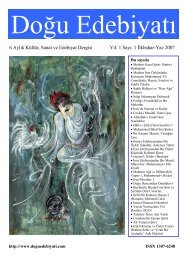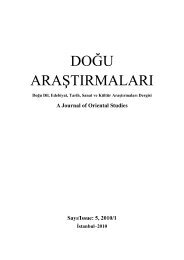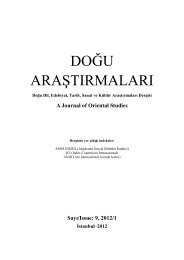A Journal of Oriental Studies Sayı/Issue - Doğu Edebiyatı
A Journal of Oriental Studies Sayı/Issue - Doğu Edebiyatı
A Journal of Oriental Studies Sayı/Issue - Doğu Edebiyatı
You also want an ePaper? Increase the reach of your titles
YUMPU automatically turns print PDFs into web optimized ePapers that Google loves.
DOĞU ARAŞTIRMALARI 4, 2009/2 45<br />
To weep; whose every passion fully strives<br />
To make itself, in thee, fair and admired! (Act 1, scene 1)<br />
Also Rumi in his Dīvân-e Shams, describes Shams Tabrīzī as a collection <strong>of</strong><br />
contradictions, in the form <strong>of</strong> an absolutely complete human:<br />
The shadow <strong>of</strong> kindness has got together with the sun <strong>of</strong> wisdom,<br />
It is from the glory <strong>of</strong> his love that this collection <strong>of</strong> contradictions has been<br />
possible (Dīvâne Shams, 131, our translation)<br />
And it is the perfection <strong>of</strong> existent love that justifies such contrasts, like<br />
Cleopatra, whose opposite features seem beautiful in her existence. Like a<br />
goddess in control <strong>of</strong> her own created world <strong>of</strong> nature, she can even lure and<br />
catch the fish out <strong>of</strong> the Nile. A Queen self-aware <strong>of</strong> her attributes:<br />
ALEXAS: Good majesty,<br />
Herod <strong>of</strong> Jewry dare not look upon you<br />
But when you are well pleased.<br />
CLEOPATRA: That Herod's head<br />
I'll have: but how, when Antony is gone<br />
Through whom I might command it? (Act 3, scene 3)<br />
In spite <strong>of</strong> her awareness <strong>of</strong> her half-goddess-half-human character, she<br />
seeks out Antony as her lost half, attempting to complete and eternalize<br />
herself through finding him.<br />
It is noticed that Antony can also display some ultra-human<br />
characteristics, although he is more earthly in comparison with<br />
Cleopatra (As he doubts Cleopatra’s fidelity, leaves her, and marries<br />
Octvia). Agrippa describes him this way:<br />
AGRIPPA: A rarer spirit never<br />
Did steer humanity: but you, gods, will give us<br />
Some faults to make us men. Caesar is touch’d. (Act 5, scene 1)<br />
As a matter <strong>of</strong> fact, Antony’s earthly qualities are bestowed to him by the<br />
gods, while he was able to share nature with them. Cleopatra is aware <strong>of</strong> this:<br />
CLEOPATRA: … nature wants stuff<br />
To vie strange forms with fancy; yet, to imagine<br />
And Antony, were nature’s piece ‘gainst fancy,<br />
Condemning shadows quite. (Act 5, scene 2)<br />
The Characters <strong>of</strong> Antony and Cleopatra have ultra-earthly and ultra-human<br />
manifestations, which are reminiscent <strong>of</strong> the divine and eternal lover in<br />
Rumi’s poetry.<br />
Shams-e Tabrīzī is frequently referred to in the Dīvân-e Shams as "the king <strong>of</strong><br />
the world." Antony and Cleopatra also have similar titles (Cleopatra is the<br />
Queen <strong>of</strong> Egypt and Antony is one <strong>of</strong> the world's greatest commanders). Eros<br />
calls Antony a great leader, and Agrippa describes him as a great king.<br />
Cleopatra also dreams <strong>of</strong> being a unique empress, a quality even Caesar<br />
admits to at the end <strong>of</strong> the play, telling her that she "had royal character." (Act<br />
2)<br />
Common Pictures: The Sun, the Moon, Stars, Jewels





